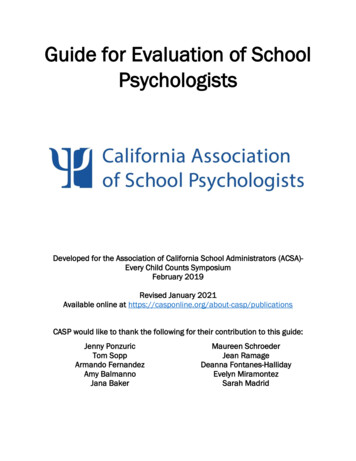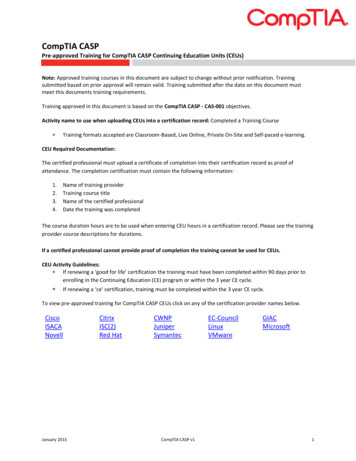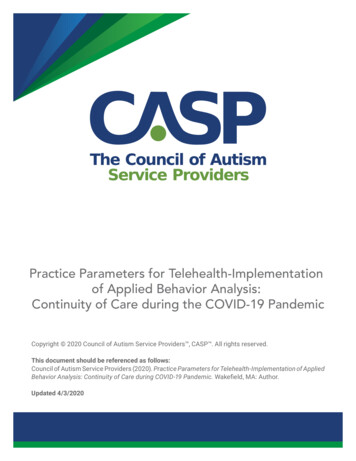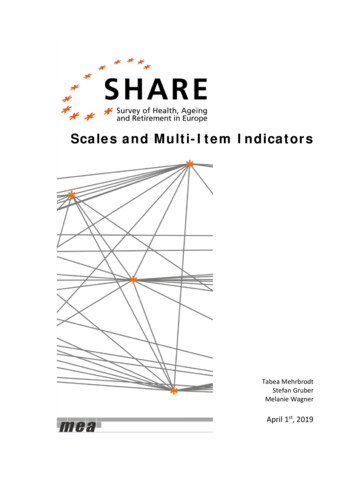
Transcription
Guide for Evaluation of SchoolPsychologistsDeveloped for the Association of California School Administrators (ACSA)Every Child Counts SymposiumFebruary 2019Revised January 2021Available online at https://casponline.org/about-casp/publicationsCASP would like to thank the following for their contribution to this guide:Jenny PonzuricTom SoppArmando FernandezAmy BalmannoJana BakerMaureen SchroederJean RamageDeanna Fontanes-HallidayEvelyn MiramontezSarah Madrid
The Guide for Evaluation of School PsychologistsBackgroundSchool districts across the state of California have struggled to find a credible andcomprehensive way to evaluate school psychologists working within their educationalsystems. This is not surprising considering the wide and diverse role and job responsibilitiesthat school psychologists currently play within our schools. Duties may include: consultationand collaboration with a wide range of district staff, community and outside agencies,providers of mental health services and interventions within Special Education programsand Multi-Tiered System of Supports (MTSS); research and program evaluation; andutilization of various methods of assessment and data collection for identifying the strengthsand needs of students they service, just to name a few.Developing a performance evaluation instrument that can adequately address these varyingand wide-ranging skills has been difficult for many districts. Unfortunately, too often schoolpsychologists are evaluated using the instruments designed for reviewing teacherperformance. In February of 2018, the California Association of School Psychologist (CASP)staffed an informational booth at the Association of California School Administrators (ACSA)conference. During the conference several school administrators stopped by the CASP boothand openly shared the difficulty they had in evaluating their school psychologists because ofthe broad nature of their roles. Many went on to suggest that CASP create a guide thatwould help them in the evaluation of their School Psychologist staff members.NASP Practice ModelIn an effort to address this issue, CASP has developed this school psychologist evaluationguide, which can be adopted and utilized by California school districts. In order to ensurerelevance to the practice of school psychology, these guidelines are based on the 10domains identified in the National Association of School Psychologists (NASP) Model forComprehensive and Integrated School Psychological Service: The NASP Practice Model2020. As stated on its website “The NASP Model for Comprehensive and Integrated SchoolPsychological Services, also known as the NASP Practice Model, represents NASP's officialpolicy regarding the delivery of school psychological services.” The goal of any educationalevaluation system is to define and promote “best practice” that may lead to positive studentoutcomes. In addition, elements from the research of R. J. Marzano, such as goal setting,self-evaluation, and supporting the school psychologist's development throughout the careercycle, have been incorporated. With this goal in mind, the CASP guidelines provide apractical, flexible and discipline-specific framework that can be utilized by districts in orderto achieve every educational system’s ultimate target.How to Use the Evaluation GuideFrom the NASP Comprehensive Practice Model, CASP created a flexible, succinct, andpractical framework that can be implemented to evaluate the varying roles and1
responsibilities of a school psychologist. We recognize that it may not be feasible tomeaningfully evaluate all elements within the NASP 10 Domains, so we highly recommendthat school districts select a subset of the NASP 10 Domains which they feel best capturesthe roles of the school psychologists in their district. This is because the priorities andservice delivery models will understandably vary from district to district and may evolve overtime. Therefore, we expect that school districts will adapt or take areas from this guide asneeded. It should be noted that most of these guidelines can be evaluated by anadministrator who is highly familiar with the school psychologist’s work, however some areasmay require more technical or advanced knowledge of school psychological services andmay require input from a qualified school psychologist in a lead position. The followingelements are attached and available for school districts in developing evaluationdocuments: Evaluation FlowchartBlank Job Performance Evaluation TemplateThree completed case samples for the Job Performance Evaluation TemplateBlank Goal Setting Template (Adapted from the NASP Growth Plan)Three completed case samples for the Goal Setting Template that are related to thecompleted Evaluation Forms10 Domain Performance Framework10 Domain Performance Framework with ExamplesPsychoeducational Report Checklist for IDEA Compliance2
School Psychologist Job Performance Evaluation FlowchartThe goal of School Psychologist evaluation process is fourfold: Provide feedback regarding the overall quality of provided psychological services. Identify services in need of enrichment. Guide professional growth. Encourage increased effectiveness of provided psychological services.The provided flowchart below is a guide to this process.Notice & Evaluation Process Orientation At the beginning of the school year, the school psychologist is notified about evaluation process,timeline, resources, and forms. Forms provided to the school psychologist include the Job Performance Evaluation Form, GoalsPage, and 10 Domains Framework.Initial Collaborative Conference On the Job Performance Evaluation Form, the school pscyhologist and administratorcollaboratively select the domains that are relevant to the employee's current assignment andcheck these areas. Collaboratively, the administrator and school psychologist select 3 domains to self-evaluate.Self-Evaluation Based on the domain(s) selected, the school psychologist determines a baseline via self-reflectionand data (school site data, previous work year's data, survey, etc.). The school psychologist drafts SMART goal(s) on Goals Page and completes action plan.Collaborative Goals Setting Meeting The school psychologist and administrator meet to discuss and finalize goals for the year. Determine the mid-year goal monitoring meeting date. Determine the observation date.Collaborative Goals Monitoring Meeting The school psychologist and administrator meet to discuss and document evidence of progresstoward goals. Any support needed to make continued growth/progress toward goals is discussed anddocumented.Final Conference Before the final conference, the school psychologist collects final evidence of progress toward each goal andsubmits to the administrator. The administrator completes the Job Performance Evaluation Form with ratings using evidence provided bythe school psychologist and provides final evaluation recording the evidence. The administrator and school psychologist meet to discuss the final evaluation.3
School Psychologist Job Performance Evaluation TemplateProtocol: At the initial collaborative conference, the evaluator and school psychologist check-off the domains relevant to the currentassignment. Collaboratively the administrator and the school psychologist check-off 3 domains to self-evaluate. At the final conference, the administrator will present the completed Evaluation form. (See School Psychologist Job PerformanceEvaluation Flowchart for details)1. Unsatisfactory- Skill not evidenced2. Needs Improvement- Skill minimally evidenced3. Proficient - Skill tedDomain 1: Data-based Decision-making123Makes use of a problem-solving framework as the basis for all professionalactivities.Collects and uses assessment data to understand students’needs/challenges.Conducts comprehensive and legally defensible assessments to identifystudents’ eligibility for special education and other educational services.Designs, implements, and uses data collection procedures for the evaluationof the effectiveness of school-based interventions and programs.Evidence:Domain 2: Consultation and CollaborationUses a consultative problem-solving process as a vehicle for planning,implementing, and evaluating academic and mental health services.Consults and collaborates at the individual, family, group, and systems levels.Applies psychological and educational principles and, by using skills incommunication, collaboration, and consultation, promotes necessary change.Evidence:Domain 3: Academic Interventions and Instructional SupportsUses all available assessment information and empirical research on learningand cognitive development to promote student success.Collaborates with other educators, parents, and the community to promotestudent success.Evidence:4
Domain 4: Mental and Behavioral Health Services and InterventionsIntegrates developmentally appropriate behavioral supports and mentalhealth services with academic and social/emotional learning goals forchildren.Facilitates the development and implementation of curriculum and programsat individual, group, classroom, and school-wide levels for student behaviors.Considers the antecedents, consequences, functions, and potential causes ofbehavioral difficulties that may impede learning or socialization.Evidence:Domain 5: School-Wide Practices to Promote LearningWorks collaboratively with school staff to enhance and support school-widepractices that promote student achievement.Promotes the development and maintenance of supportive learningenvironments.Evidence:Domain 6: Services to Promote Safe and Supportive SchoolsPromotes recognition of risk and protective factors.Participates in school crisis teams.Provides direct counseling, behavioral coaching, and indirect interventionsthrough consultation for students who experience mental health problems.Develops, promotes, and evaluates wellness and resilience programs.Evidence:Domain 7: Family, School, and Community CollaborationUses evidence-based strategies to design, implement, and evaluate effectivepolicies and practices.Promotes strategies for safe, nurturing, and dependable parenting and homeinterventions.Helps create linkages between schools, families, and community providers,and helps coordinate services when programming.Evidence:5
Domain 8: Equitable Practices for Diverse Student PopulationsApplies understanding of the influence of culture, background, and individuallearning characteristics.Utilizes a problem-solving framework for addressing the needs of studentswith diverse characteristics.Promotes fairness and social justice and provides culturally competent andeffective practices.Evidence:Domain 9: Research and Evidence-Based PracticeEvaluates and synthesizes a cumulative body of research findings as afoundation for effective service delivery.Incorporates techniques for data collection, analyses, and accountability inevaluation of services.Evidence:Domain 10: Legal, Ethical, and Professional PracticePractices in ways, and engages in collaborative relationships, that areconsistent with ethical, professional, and legal standards and regulations.Assists school personnel and parents in understanding and adhering tolegislation and regulations.Engages in lifelong learning and professional development.Utilizes information sources and technology and responsible record keeping.Evidence:Adjunct Duties and/or activities that support student progress:Commendations:Professional Growth Activities:6
Suggestions to enhance professional development:Recommendation for Continued Employment:Continuation Recommended- Meets or Exceeds StandardsContinuation with Improvement(s) RecommendedContinuation with Improvement(s) RequiredNot Recommended for ContinuationEvaluator’s Printed Name: Date:Evaluator’s Signature:Date:I certify that this report has been discussed with me. I understand that my signature does not necessarily indicateagreement. Further, I understand I may make a written response to the evaluation at any time up to fifteen (15)days after receiving a copy of the evaluation.Evaluatee’s Printed Name:Date:Evaluatee’s Signature:Date:7
SAMPLE 1School Psychologist Job Performance EvaluationName: Serena School PsychologistEmployment Status: ProbationaryAssignment Location(s): Pre-School Assessment CenterDate of Initial Conference: SeptemberDate of Observation(s): DecemberDate of Progress Conference: JanuaryEvaluator: Allen AdministratorDate of Final Conference: JuneProtocol: At the initial collaborative conference, the evaluator and school psychologist check-off the domains relevant to the current assignment. Collaboratively the administrator and the school psychologist check-off 3 domains to self-evaluate. At the final conference, the administrator will present the completed Evaluation form (See School Psychologist Job PerformanceEvaluation Flowchart for details).1. Unsatisfactory- Skill not evidenced2. Needs Improvement- Skill minimally evidenced3. Proficient- Skill tedDomain 1: Data-based Decision-making123Makes use of a problem-solving framework as the basis for all professionalactivities.XCollects and uses assessment data to understand students’needs/challenges.XConducts comprehensive and legally defensible assessments to identifystudents’ eligibility for special education and other educational services.XDesigns, implements, and uses data collection procedures for the evaluationof the effectiveness of school-based interventions and programs.XEvidence: Serena has been trained and effectively developed her pre-school assessment skills for students on the Autismspectrum. After reviewing reports, Serena’s psychoeducational reports meet IDEA compliance.Domain 2: Consultation and CollaborationUses a consultative problem-solving process as a vehicle for planning,implementing, and evaluating academic and mental health services.Consults and collaborates at the individual, family, group, and systems levels.Applies psychological and educational principles and, by using skills incommunication, collaboration, and consultation, promotes necessary change.Evidence:Domain 3: Academic Interventions and Instructional SupportsUses all available assessment information and empirical research on learningand cognitive development to promote student success.8
Collaborates with other educators, parents, and the community to promotestudent success.Evidence:Domain 4: Mental and Behavioral Health Services and InterventionsIntegrates developmentally appropriate behavioral supports and mentalhealth services with academic and social/emotional learning goals forchildren.Facilitates the development and implementation of curriculum and programsat individual, group, classroom and school-wide levels for student behaviors.Considers the antecedents, consequences, functions, and potential causes ofbehavioral difficulties that may impede learning or socialization.Evidence:Domain 5. School-Wide Practices to Promote LearningWorks collaboratively with school staff to enhance and support school-widepractices that promote student achievement.Promotes the development and maintenance of supportive learningenvironments.Evidence:Domain 6: Services to Promote Safe and Supportive SchoolsPromotes recognition of risk and protective factors.Participates in school crisis teams.Provides direct counseling, behavioral coaching, and indirect interventionsthrough consultation for students who experience mental health problems.Develops, promotes, and evaluates wellness and resilience programs.Evidence:Domain 7: Family, School, and Community CollaborationUses evidence-based strategies to design, implement, and evaluate effectivepolicies and practices.Promotes strategies for safe, nurturing, and dependable parenting and homeinterventions.Helps create linkages between schools, families, and community providers,and helps coordinate services when programming.Evidence:Domain 8: Equitable Practices for Diverse Student PopulationsApplies understanding of the influence of culture, background, and individuallearning characteristics.X9
Utilizes a problem-solving framework for addressing the needs of studentswith diverse characteristics.XPromotes fairness and social justice and provides culturally competent andeffective practices.XEvidence: Serena’s knowledge in Cambodian culture is reflected in the nuances in her assessment, observed in analysisof assessment data, in report writing, in her work with parents, and in self- reported confidence.Domain 9: Research and Evidence-Based PracticeEvaluates and synthesizes a cumulative body of research findings as afoundation for effective service delivery.Incorporates techniques for data collection, analyses, and accountability inevaluation of services.Evidence:Domain 10: Legal, Ethical, and Professional PracticePractices in ways, and engages in collaborative relationships, that areconsistent with ethical, professional, and legal standards and regulations.Assists school personnel and parents in understanding and adhering tolegislation and regulations.Engages in lifelong learning and professional development.Utilizes information sources and technology and responsible record keeping.Evidence:Adjunct Duties and/or activities that support student progress: This is Serena’s second year at the Pre-School AssessmentCenter. She has organized and hosted a parent workshop.Commendations: Parents that Serena has worked with speak very highly of her.Professional Growth Activities: Serena is eager to learn and seeks further training on assessing pre-schoolers. In the future,she would like to improve the behavioral components of her assessments. Next year, Serena will attend a behavioralassessment and intervention training offered at the County Office of Education.Suggestions to enhance professional development: Serena is encouraged to attend the annual CASP convention to updateher skills.10
Recommendation for Continued Employment:XContinuation Recommended- Meets or Exceeds StandardsContinuation with Improvement(s) RecommendedContinuation with Improvement(s) RequiredNot Recommended for ContinuationEvaluator’s Printed Name: Date:Evaluator’s Signature:Date:I certify that this report has been discussed with me. I understand that my signature does not necessarily indicateagreement. Further, I understand I may make a written response to the evaluation at any time up to fifteen (15)days after receiving a copy of the evaluation.Evaluatee’s Printed Name:Date:Evaluatee’s Signature: Date:Click here to see related SAMPLE School Psychologist Goal Setting Template11
Sample 2School Psychologist Job Performance EvaluationName: Sally School PsychologistEmployment Status: PermanentAssignment Location(s): Comprehensive MSDate of Initial Conference: SeptemberDate of Observation(s): DecemberDate of Progress Conference: JanuaryEvaluator: Allen AdministratorDate of Final Conference: JuneProtocol: At the initial collaborative conference, the evaluator and school psychologist check-off the domains relevant to the current assignment. Collaboratively the administrator and the school psychologist check-off 3 domains to self-evaluate. At the final conference, the administrator will present the completed Evaluation form. (See School Psychologist Job PerformanceEvaluation Flowchart for details)1. Unsatisfactory- Skill not evidenced2. Needs Improvement- Skill minimally evidenced3. Proficient- Skill tedDomain 1: Data-based Decision-making123Makes use of a problem-solving framework as the basis for all professionalactivities.Collects and uses assessment data to understand students’needs/challenges.Conducts comprehensive and legally defensible assessments to identifystudents’ eligibility for special education and other educational services.Designs, implements, and uses data collection procedures for the evaluationof the effectiveness of school-based interventions and programs.Evidence:Domain 2: Consultation and CollaborationUses a consultative problem-solving process as a vehicle for planning,implementing, and evaluating academic and mental health services.XConsults and collaborates at the individual, family, group, and systems levels.XApplies psychological and educational principles and, by using skills incommunication, collaboration, and consultation, promotes necessary changeXEvidence: Sally brought her expertise of evidenced-base practices for behavior and effectively communicated how toimplement the intervention with staff. In addition, she is able to gain buy-in with staff with her personable collaborativeapproach.12
Domain 3: Academic Interventions and Instructional SupportsUses all available assessment information and empirical research on learningand cognitive development to promote student success.Collaborates with other educators, parents and the community to promotestudent success.Evidence:Domain 4: Mental and Behavioral Health Services and InterventionsIntegrates developmentally appropriate behavioral supports and mentalhealth services with academic and social/emotional learning goals forchildren.Facilitates the development and implementation of curriculum and programsat individual, group, classroom, and school-wide levels for student behaviors.Considers the antecedents, consequences, functions, and potential causes ofbehavioral difficulties that may impede learning or socialization.Evidence:Domain 5: School-Wide Practices to Promote LearningWorks collaboratively with school staff to enhance and support school-widepractices that promote student achievement.XPromotes the development and maintenance of supportive learningenvironments.XEvidence: Sally is considered a leader at her site and respected among the staff. She has successfully implemented aCICO system. She is near finished training a staff member to coordinate the program next school year.Domain 6: Services to Promote Safe and Supportive SchoolsPromotes recognition of risk and protective factors.Participates in school crisis teams.Provides direct counseling, behavioral coaching, and indirect interventionsthrough consultation for students who experience mental health problems.Develops, promotes, and evaluates wellness and resilience programs.Evidence:Domain 7: Family, School, and Community CollaborationUses evidence-based strategies to design, implement, and evaluate effectivepolicies and practices.Promotes strategies for safe, nurturing, and dependable parenting and homeinterventions.Helps create linkages between schools, families, and community providers,and helps coordinate services when programming.Evidence:13
Domain 8: Equitable Practices for Diverse Student PopulationsApplies understanding of the influence of culture, background, and individuallearning characteristics.Utilizes a problem-solving framework for addressing the needs of studentswith diverse characteristics.Promotes fairness and social justice and provides culturally competent andeffective practices.Evidence:Domain 9: Research and Evidence-Based PracticeEvaluates and synthesizes a cumulative body of research findings as afoundation for effective service delivery.XIncorporates techniques for data collection, analyses, and accountability inevaluation of services.XEvidence: On a weekly basis Sally creates charts that graph students’ progress and shares with relevant staff.Domain 10: Legal, Ethical, and Professional PracticePractices in ways, and engages in collaborative relationships, that areconsistent with ethical, professional, and legal standards and regulations.Assists school personnel and parents in understanding and adhering tolegislation and regulations.Engages in lifelong learning and professional development.Utilizes information sources and technology and responsible record keeping.Evidence:Adjunct Duties and/or activities that support student progress: Sally participated in the site’s Multi-tiered System ofSupports (MTSS) mapping of the site’s interventions.Commendations: Sally is the president of her local guild.Professional Growth Activities: Sally will attend an Excel workshop to enhance her charting skills.Suggestions to enhance professional development: Sally is encouraged to attend the annual CASP convention to updateher skills.14
Recommendation for Continued Employment:XContinuation Recommended- Meets or Exceeds StandardsContinuation with Improvement(s) RecommendedContinuation with Improvement(s) RequiredNot Recommended for ContinuationEvaluator’s Printed Name: Date:Evaluator’s Signature:Date:I certify that this report has been discussed with me. I understand that my signature does not necessarily indicateagreement. Further, I understand I may make a written response to the evaluation at any time up to fifteen (15)days after receiving a copy of the evaluation.Evaluatee’s Printed Name:Date:Evaluatee’s Signature: Date:Click here to see related SAMPLE School Psychologist Goal Setting Template15
SAMPLE 3School Psychologist Job Performance EvaluationName: John School PsychologistAssignment Location(s): ERMHS DIS counseling (Tier 3)provider for SPED students.Date of Observation(s): DecemberEvaluator: Allen AdministratorEmployment Status: PermanentDate of Initial Conference: SeptemberDate of Progress Conference: JanuaryDate of Final Conference: JuneProtocol: At the initial collaborative conference, the evaluator and school psychologist check-off the domains relevant to the current assignment. Collaboratively the administrator and the school psychologist check-off 3 domains to evaluate and develop goals. At the final conference, the administrator will present the completed Evaluation form. (See School Psychologist Job PerformanceEvaluation Flowchart for details)1. Unsatisfactory- Skill not evidenced2. Needs Improvement- Skill minimally evidenced3. Proficient- Skill tedDomain 1: Data-based Decision-making123Makes use of a problem-solving framework as the basis for all professionalactivities.Collects and uses assessment data to understand students’needs/challenges.Conducts comprehensive and legally defensible assessments to identifystudents’ eligibility for special education and other educational services.Designs, implements, and uses data collection procedures for the evaluationof the effectiveness of school-based interventions and programs.Evidence:Domain 2: Consultation and CollaborationUses a consultative problem-solving process as a vehicle for planning,implementing, and evaluating academic and mental health services.Consults and collaborates at the individual, family, group, and systems levels.Applies psychological and educational principles and, by using skills incommunication, collaboration, and consultation, promotes necessary change.Evidence:Domain 3: Academic Interventions and Instructional SupportsUses all available assessment information and empirical research on learningand cognitive development to promote student success.Collaborates with other educators, parents, and the community to promotestudent success.Evidence:Domain 4: Mental and Behavioral Health Services and InterventionsIntegrates developmentally appropriate behavioral supports and mentalhealth services with academic and social/emotional learning goals forchildren.Facilitates the development and implementation of curriculum and programsat individual, group, classroom, and school-wide levels for student behaviors.Considers the antecedents, consequences, functions, and potential causes ofbehavioral difficulties that may impede learning or socialization.Evidence: John has effectively implemented trauma-based interventions.XXX16
Domain 5: School-Wide Practices to Promote LearningWorks collaboratively with school staff to enhance and support school-widepractices that promote student achievement.Promotes the development and maintenance of supportive learningenvironments.Evidence:Domain 6: Services to Promote Safe and Supportive SchoolsPromotes recognition of risk and protective factors.XParticipates in school crisis teams.XProvides direct counseling, behavioral coaching, and indirect interventionsthrough consultation for students who experience mental health problems.Develops, promotes, and evaluates wellness and resilience programs.XEvidence: John effectively provided staff training on suicide prevention.Domain 7: Family, School, and Community CollaborationUses evidence-based strategies to design, implement, and evaluate effectivepolicies and practices.Promotes strategies for safe, nurturing, and dependable parenting and homeinterventions.Helps create linkages between schools, families, and community providers,and helps coordinate services when programming.Evidence: John provides a tiered level of counseling and behavior support to families including providing group andindividual services.XDomain 8: Equitable Practices for Diverse Student PopulationsApplies understanding of the influence of culture, background, and individuallearning characteristics.Utilizes a problem-solving framework for addressing the needs of studentswith diverse characteristics.Promotes fairness and social justice and provides culturally competent andeffective practices.Evidence:Domain 9: Research and Evidence-Based PracticeEvaluates and synthesizes a cumulative body of research findings as afoundation for effective service delivery.Incorporates techniques for data collection, analyses, and accountability inevaluation of services.Evidence:Domain 10: Legal, Ethical, and Professional PracticePractices in ways, and engages in collaborative relationships, that areconsistent with ethical, professional, and legal standards and regulations.Assists school personnel and par
the broad nature of their roles. Many went on to suggest that CASP create a guide that would help them in the evaluation of their School Psychologist staff members. NASP Practice Model In an effort to address this issue, CASP has developed this school psychologist evaluation guide, which can be adopted and utilized by California school districts.










